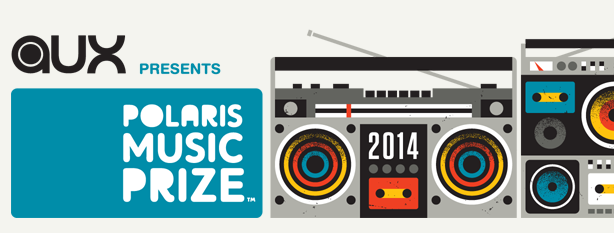 Music
Music
The Polaris Music Prize by the odds
by AUX staff
September 15, 2014
To us, the Polaris Music Prize is about two things: Celebrating Canadian music and arguing about Canadian music. Indeed, the prize’s 203-person jury, made up of members of the Canadian media, spend all year parsing out the year’s best albums, eventually whittling the heap down to 10 shortlisted albums. At the Polaris Music Prize gala—taking place this year at the Carlu in Toronto—a grand jury will pick the year’s best Canadian album, and while there’s no knowing which album will take home $30,000 and eternal bragging rights, we can always speculate. Gamblers as we are, we’ve also listed the odds of each album winning the prize, as ranked with our proprietary scientific (read: not scientific) Polaris algorithm. Let the arguments begin.
By: Mark Teo (MT) and Mohan Fitzgerald (MF)
Arcade Fire—Reflektor
What it is: An album that’s been talked about for so long, it feels like it could’ve been nominated in 2013. In reality, it was Arcade Fire’s fourth studio album, and, thanks to their guerrilla marketing campaign (which had stencils and spraypaint appearing as far away as Austin, Tex.), their most anticipated, following a flawless run of Funeral, Neon Bible, and the maximalist 2011 Polaris winner The Suburbs.
Why it should win: In 2014, is there any band that’s as synonymous with indie rock as the Arcade Fire? Opinions on the Haiti-inspired Reflektor were polarizing, but they’re still a band that, as evidenced by Arcade Fire’s imprint on countless bands, are emblematic of Canada. Plus, Reflektor is just as singular as any previous Butler-Chassagne effort.
Why it shouldn’t win: It’s a singular album in aesthetic, but few—aside from the extremely contrarian—would argue it the band’s best. It is, in fact, the band’s worst by consensus. Sure, Arcade Fire are better than most even at their lowest, but it feels so medicore (and perhaps too Canadian) to reward an established act for their least impressive tome, one marred by questionable optics, indulgent musical passages, and half-baked political gestures.
Metacritic score: 80
Odds of winning: 2% (MT)
Drake—Nothing Was the Same
What it is: An international smash that not only cemented, but justified, Drake’s status (and his hometown’s rep) among hip-hop’s global elite. Thanks to seven heat-seeking singles—“Started From the Bottom,” “Hold On, We’re Going Home,” and “Worst Behaviour” among them—Nothing Was the Same melted the hearts of even the most ardent haters. Well, most.
Why it should win: It’s not only one of Canada’s best albums. It’s one of the best hip-hop releases in recent memory period. And despite the fact that Drake speaks for the 6, there are few Canadian artists who occupy the cultural zeitgeist quite like Wheelchair Drizzy.
Why it shouldn’t win: Its cynics will argue that the Polaris Music Prize, and the cash, press, and prestige it brings, needn’t be awarded to an already established global star. But, of course, isn’t an album meant to be nominated for its artistic merits alone?
Metacritic score: 79
Odds of winning: 31% (MT)
Jessy Lanza—Pull My Hair Back
What it is: A stunning, left-field debut that began in Hamilton, but was released by legendary forever-hyped British electronic label Hyperdub. Its initial press focused on Junior Boy Jeremy Greenspan’s involvement with Pull My Hair Back, but don’t kid yourself: Lanza’s not just a singer. She co-produced the LP’s R&B infused electro and deserves every ounce of credit.
Why it should win: It’s an incredibly accomplished debut, and one that’s internationally recognized, too. Lanza’s slated to be a star both in the club and beyond it, and it’s probably the strongest consensus Canadian electronic LP since Azari and III’s self-titled debut.
Why it shouldn’t win: Outside of Caribou’s legendary Andorra, no electronic LP has won the Polaris—leading many to criticize the prize for being too rock-centric. Those criticisms aren’t wrong, and for that reason, Pull My Hair Back is an unlikely contender.
Metacritic score: 79
Odds of winning: 5% (MT)
Mac DeMarco—Salad Days
What it is: The follow-up to DeMarco’s sensational II, the album that turned the gap-toothed jokester into an international cult star with tracks such as “Ode to Viceroy.” Salad Days not only cemented his longevity, but outdid its predecessor: Beyond being a cult of personality, DeMarco’s anxiety-ridden lyrics offered depth behind his singular sound—which sounds like a warped record—and shit-eating grin.
Why it should win: Because, thanks to its complexity, DeMarco’s being hailed as the voice of a generation—and he represents the Edmonton, Vancouver, and Montreal music communities that fostered him. Fun fact: Salad Days is also the 9th best-selling vinyl record in 2014. No other Polaris nom registered in the top 10.
Why it shouldn’t win: As with Drake, Salad Days is a zeitgeist-capturing album. But it’s arguable that DeMarco doesn’t need the Polaris. It’s arguable, after all, that Salad Days will land a spot on Pitchfork’s year-ender.
Metacritic score: 83
Odds of winning: 23% (MT)
Basia Bulat—Tall Tall Shadow
What it is: The folk crooner’s most ambitious record to date, and that’s saying something for an artist who’s been on this list before. Bulat is known for playing the autoharp—an instrument that embodies her sentimental and quirky style—live and in the studio, but it doesn’t appear quite as much on Tall Tall Shadow as it did on her former releases. The production credit to Arcade Fire’s Mark Lawson and Tim Kingsbury certainly testifies to Bulat’s slight sonic departure.
Why it should win: It’s a rock-solid album that strikes an impressive stylistic balance. There’s still some of that almost waltzy backbeat and the occasional autoharp refrain, but this time amid a modern-sounding organ and pop-synth soundscape. There’s also considerably more Arcade Fire: a mostly tasteful injection of the drippy, reverb-soaked sound that’s surely won her more mainstream attention.
Why it shouldn’t win: Part of the album was recorded in a dance hall, and while it doesn’t exactly scream EDM, Bulat’s sound might be a little less distinctive on this LP. That also makes it a real so-called “predictable Polaris” pick—right in the indie/alternative wheelhouse.
Metacritic score: 72
Odds of winning: 11% (MF)
Owen Pallett—In Conflict
What it is: Beloved violinist Owen Pallett’s fourth solo LP, and his first since 2010’s Heartland. No longer just Canadian music’s most beloved session player—though by our estimation, he’s appeared on nearly as many Polaris-nominated releases as Colin Stetson—Pallett’s emerged as one of Canadian music’s most thoughtful and articulate voices.
Why it should win: Because, in a career that’s constantly shapeshifting, In Conflict is Pallett’s most ruminative work yet. His crystalline, circular violin melodies and quivering vocals are still the backbone of his music, but there’s also the sense that the LP also tackles the creative process itself: Each song-vignette tackles the oft-difficult relationship between insanity and the creative process. “A depressed person needs problems, actual real problems, in order for them to feel at home,” Pallett told AUX. Conflicting? You bet.
Why it shouldn’t win: While it’s an impressive progression of Pallett’s career—and a mouthful, conceptually—In Conflict occasionally feels shapeless. Not that it’s a significant criticism; In Conflict is nothing if high concept, but it’s hard to see it winning the populist vote.
Metacritic score: 82
Odds of winning: 7% (MT)
Shad—Flying Colours
What is it: Shad’s fourth studio album, released after a sizeable gap in the wordsmith’s just plain likeable career in hip-hop. Shad is kind of like the anti-Drake on this short list: he’s uncontroversial, sonically and lyrically consistent throughout his career, and very much a Canadian secret. An international breakout would have happened with the release of TSOL if it was ever in the cards, but the proof that Canada doesn’t really care was Shad’s shocking Juno win over Drake in 2011.
Why it should win: Because Shad’s a national treasure—Canada’s rap-Golden Boy. He’s still collaborating with Toronto old-schoolers like Saukrates and k-os, and a short absence from the game has done nothing to tarnish the truly first-rate wordplay that sets him apart from the crowd.
Why it shouldn’t win: Shad’s not exactly pushing the envelope. While the production on Flying Colours is bit more ambitious than some of his earlier work, previous winners have generally had their fingers firmly on the pulse—and rightfully so. He’s also been nominated twice before, and co-hosted the Gala last year, but still no nod.
Metacritic score: N/A
Odds of winning: 4% (MF)
Tanya Tagaq—Animism
What it is: A visceral album that defies genres like oil repels water. Nunavut born Tagaq is primarily known for the traditional Inuit throat-singing that makes her live shows something of a spectacle, but—thanks, in part, to producer Jesse Zubolt—Animism places her rasping vocals right in your face, and the wild cacophony of her homeland squarely in the backdrop.
Why it should win: It’s almost certainly the most original album here; the combination of marching, string-heavy production and a jarring vocal marathon make it one of most emotionally salient ones, too.
Why it shouldn’t win: It might share too many of the neo-classical elements that won Owen Pallett’s He Poos Clouds the award back in ‘06. It’s also just so freaking raw: sometimes Animism sounds like the film-score to a movie we’re too scared to watch.
Metacritic score: N/A
Odds of winning: 4% (MF)
Timber Timbre—Hot Dreams
What it is: The album that made Timber Timbre “sexy”—or at least that’s the public consensus. True, the title track is the closest thing to a love song that you’re likely to hear from the group that released Creep On Creepin’ On three years ago, but Hot Dreams is still brimming with the obsessive and sinister qualities that make this band unique. It’s like the deranged love-child of Pink Floyd’s Shine On You Crazy Diamond, old-school westerns, and the Trailer Park Boys theme song. A highlight: the renewed presence of saxophonist Colin Stetson.
Why it should win: Because it’s the generational anthem we feel weird about wanting—subversive, nostalgic, and moody. A pretty clear improvement on their last record, which was a Polaris shortlister itself. There’s more space, better production, and an impressive control over the quiet tension that has earned Timber Timbre a reputation for making “cinematic” music.
Why it shouldn’t win: Hot Dreams has some gaps; there are more thoughtful and more complete albums on this list. It’s also pretty strange, but that hasn’t stopped judges in the past.
Metacritic score: 80
Odds of winning: 10% (MF)
Yamantaka // Sonic Titan – UZU
What is it: The album that proved that Yamantaka // Sonic Titan’s so-called noh-wave—shorthand for the band’s blend of opera, metal, prog, and even Japenese pop—was no fluke. UZU is the band’s second LP and, while not conceptually distant from their debut, established them as one of Canada’s most unique bands.
Why it should win: Quite simply, is there a band who possesses a more singular sound on the shortlist? Singer Ruby Kato Attwood has come into her own, and her wavering, gorgeous vocals float atop tracks that twist and turn through YT // ST’s myriad elements, resulting in tracks that manage to be both sludgy and beautiful. And, in the case of “Hall of Mirrors,” the band proves they can be both proggy and terrifying.
Why it shouldn’t win: Yes, it’s a bolder, better-blended collection than their debut. But it’s also not a massive progression of their sound—and for that reason, the LP failed to grasp our curiosity in the same way YT // ST did.
Metacritic score: 79
Odds of winning: 3% (MT)
Tags: Music, Cancon, News, arcade fire, basia bulat, Drake, Jessy Lanza, Mac DeMarco, owen pallett, Shad, Tanya Tagaq, Timber Timbre, YAMANTAKA // SONIC TITAN





